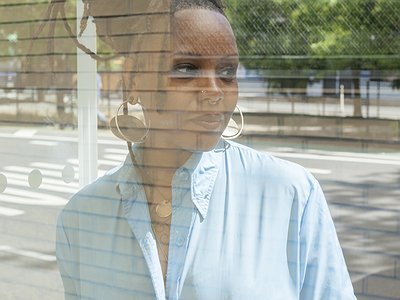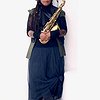Part 1
Name: Matana Roberts
Nationality: American
Occupation: Saxophonist, improviser, composer
Current album: Coin Coin Chapter Three: River Run Thee
Current Tour: Matana Roberts European Tour October 2015
Labels: Central Control International, Constellation, Relative Pitch
Bands: Matana Roberts Quartet, Sticks And Stones
Musical Recommendations: Christine Sun Kim, Tomeka Reid, Connie Crothers, Josh Abrams, Cooper Moore, Kelsey Lu McJunkins, Gordon Allen
When did you start playing your instrument, and what or who were your early passions or influences?
I started playing music when I was 8 years old. I loved classical music, theater and dance. I was exposed to a lot of art and music and performance as a child, and got a lot of free music instruction in my public school system.
For most artists, originality is first preceded by a phase of learning and, often, emulating others. What was this like for you? How would you describe your own development as an artist and the transition towards your own voice?
I don't believe in originality, we're all part of the same circular chain. But I have always seemed to gravitate towards having at least an approach to things that speaks my individual truth, whether that has been music or just living life you know? And I guess at this point I still feel I'm developing, so not sure I can answer this truthfully. But I of course spent time trying to be as musical and nuanced as many of my heroes.
Tell me about your instrument, please. How would you describe the relationship with it?
Love/Hate. She is my oldest friend and compatriot but she can be really hard to get along with sometimes :)
What are its most important qualities and how do they influence the musical results – and possibly even your own performance?
The saxophone was created to mimic the presence of the human voice and so I feel this deeply affects how I try to create the musical results in terms of remembering the importance of communication and connection that deeply resonates from the placement of language that is of the body.
Many artists feel as though, at some point, certain people gave them the ”permission to do certain things”. How was that for you – in which way did the work of particular artists before you “allow” you to take decisions which were vital for your creative development?
I was always surrounded by artists across many genres and mediums who always spoke of the importance of not asking permission, just doing what feels true. That had a heavy affect on me for sure.
What were some of your main artistic challenges when starting out as an artist and in which way have they changed over the years?
Being told by multiple teachers that I didn't have what it would take to be an artist. Had one teacher who told me that the only way I'd have an "in" would be if I married another artist. But for every negative person I've had 100 positive folks. The next hard thing I would say has just revolved around balancing finances. New York City is grossly expensive. It's almost impossible to have an art life here, but it can be done, if you're careful. I've had a great deal of help and support from my community here, for that I will always be grateful ... There are new challenges though … the challenges never go away … but that's good. Keeps me curious!
What do improvisation and composition mean to you and what, to you, are their respective merits?
They are one in the same to me. Merits? I would just say they allow me to experience a freedom that is leading me through a rather extraordinary existence. I feel very blessed ...
How do you see the relationship between sound, space and performance and what are some of your strategies and approaches of working with them?
I guess I just visualize and feel a very specific inner connectivity, a weave of sorts and that is how I treat them.
Derek Bailey defined improvising as the search for material which is endlessly transformable. Regardless of whether or not you agree with his perspective, what kind of materials have turned to be particularly transformable and stimulating for you?
The idea of "history" and the questioning of such. I love American history, my work is in a sense, my love letter to the existence of that history, warts and all!
Purportedly, John Stevens of the Spontaneous Music Ensemble had two basic rules to playing in his ensemble: (1) If you can't hear another musician, you're playing too loud, and (2) if the music you're producing doesn't regularly relate to what you're hearing others create, why be in the group. What's your perspective on this statement and how, more generally, does playing in a group compare to a solo situation?
That's truly a matter of perspective and although I understand it, I don't really roll that way all the time ... I also take great inspiration in the Cage/Cunningham idea of of the primacy of an individual idea. Also the great poet Jayne Cortez spoke of this to me once. Sometimes it is important as it is in society to have outspoken-ness, upset, anarchy, debate … agreeing to disagree is also agreement in a sense ... and so it is also in improvised contexts.






